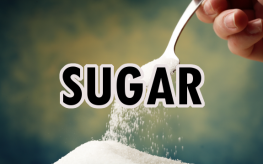An Obscenely Obesogenic Food: Sugar Being Revisited by World Health Organization
An Obscenely Obesogenic Food: Sugar Being Revisited by World Health Organization
It looks like the World Health Organization finally woke from its sugar-induced coma to address the serious health concerns which sugar intake poses upon the world.

It has been known for decades that sugar affects the brain and body in extremely detrimental ways. Some experts have even called sugar ‘more addictive than cocaine’. It is in almost all packaged foods we purchase, and sometimes hides in less obvious places, like in salad dressing, tomato sauce and yogurt, or foods labeled as ‘low fat’ or ‘all natural.’ In fact, “low-fat” foods contain 20% more sugaron average than the full-fat counterparts.
The food manufacturing industry also likes to cleverly hide sugar in food labels by calling it glucose, sucrose, maltose, dextrose, lactose, fructose, and starch, for example. Sometimes they even separate them out into multiple types of ‘sugar’ so that it is not listed as the very first item on a food’s ingredient list. This is a sneaky way of making you think the food product isn’t full of obesity-causing, brain-killing sugar.
Furthermore, much of the high fructose corn syrup and sugar beets used to sweeten our food is made from genetically modified organisms. So while you are becoming addicted to sugar because it is sugar, you are also becoming addicted to pure poison that can alter your DNA.
What happens to the brain when we eat too much sugar? After a signal is sent to the cerebral cortex and filters through other parts of the brain to ‘reward’ our choice to eat sugar, we do it again. After very little time and a few repetitive actions such as this one, our brain actually starts to go haywire. We then experience cravings, increased tolerance to sugar, and the need to have ever-larger quantities of the stuff to get that same pleasurable ‘high’ we got from a bowl of ice cream or a warm chocolate brownie. Soon, just like any addict to street drugs, our body can’t tell when enough is enough, and we end up wanting sugar all the time – even though it is killing our gut flora, our immunity, and even brain cells themselves.
It is for this reason that the WHO has now changed their recommendations for sugar intaketo be less than 5% of someone’s total daily caloric intake – down from 10%. This has incredible implications for numerous reasons. Firstly, it means that the top three diseases in the U.S. would be drastically minimized since they are all related to obesity. Sugar has a high calorie content and little to no nutrition. This is another reason it makes us fat, aside from creating uncontrollable cravings. (To find the amount of calories from sugar in a product, multiply the grams by four. For example, one tablespoon of sugar contains approximately 13 grams, which means 52 calories in that small amount of food.)
Secondly, it means that any county still arguing that water needs to be fluoridated to kill cavities would have no sound argument any longer, since Dr. Francesco Branco has stated that if children’s sugar intake is less than 5% of their daily calorie intake, they will have hardly any tooth decay. Harvard has also linkedabove-normal blood sugar levels to dementia. Other studies also show that sugar, not fat, is the true reason behind the obesity epidemic in the US, and elsewhere.
1. High Blood Pressure 2. Heart Disease 3. Diabetes 4. High Cholesterol 5. Infertility 6. Cancer 7. Back Pain 8. Skin Infections 9. Ulcers 10. GallstonesIf people started consuming less sugar, what would all the pharmaceutical companies do with their billion dollar drugs meant to mask all these ailments?
If you have a sugar addiction already”
Start by replacing sweet foods with healthful ones as best as you can. Remember, the less sugar you eat, the less dopamine your brain will make, and less you will crave it. You can also take chromium, which can help to stifle sugar cravings. 200 mg a day can help to level blood glucose levels. Eating more ‘sweet tasting’ protein will help with reducing sugar consumption. Mix some raw cacao powder with avocado or with organic peanut butter; whenever you really want sugar, have a teaspoon of this mixture that you’ve kept in the refrigerator as ‘emergency’ sugar craving food. If you are addicted to sugary drinks, start watering them down until you don’t want them as often or at all. Kicking the sugar habit will likely help you ditch all sorts of Big Pharma meds, and help you to enjoy the vital health you deserve.| About Christina Sarich: | |
| Christina Sarich is a humanitarian and freelance writer helping you to Wake up Your Sleepy Little Head, and See the Big Picture. Her blog is Yoga for the New World. Her latest book is Pharma Sutra: Healing the Body And Mind Through the Art of Yoga. | |
Other Popular Stories:
Get The NaturalSociety Natural Health Newsletter!
Post a Comment